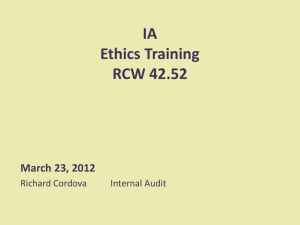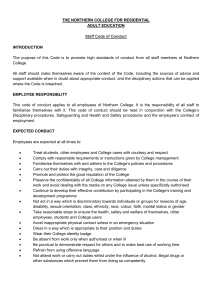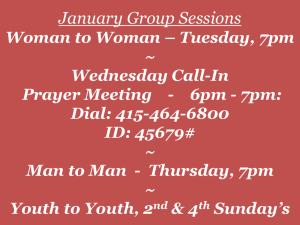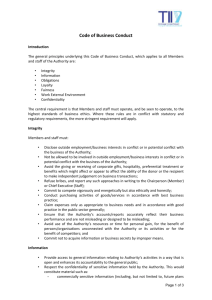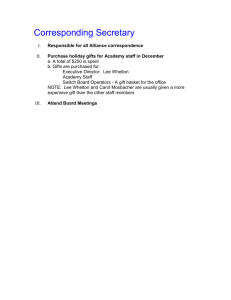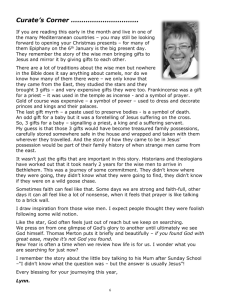Gifts - Capital Projects Office
advertisement
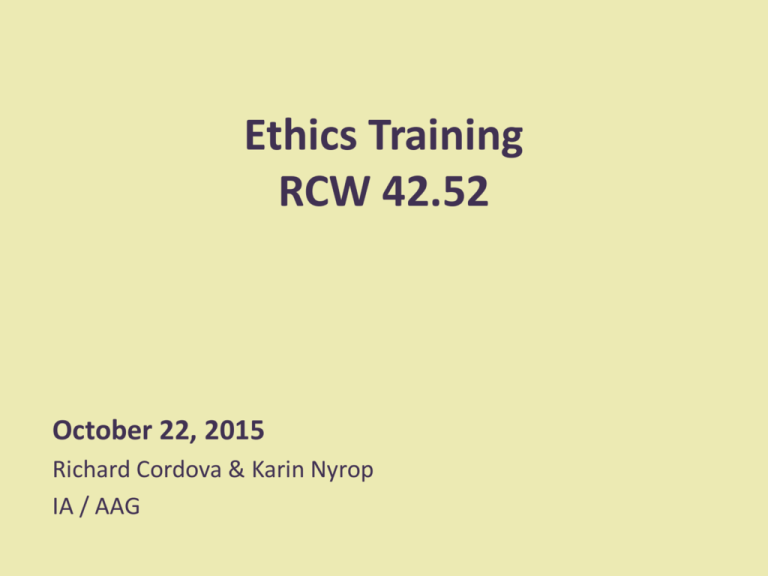
Ethics Training RCW 42.52 October 22, 2015 Richard Cordova & Karin Nyrop IA / AAG Agenda • Why Important • Overview of Ethics Board • Major Subject Areas of the Law Conflicts of Interest Gifts Use of University Resources Outside Employment 2 RCW 42.52 - Ethics In Public Service Sections: • • • • • • • • • • • • .020 .030 .040 .050 .070 .080 .110 .120 .140 .160 .180 .220 Activities Incompatible w/ public duties (Conflict of Interest) Financial interests in transactions Assisting in transactions Confidential information Special privileges Employment after public service Compensation for official duties or nonperformance Compensation for outside duties Gifts Use of State resources Use of State resources for political campaigns Universities – Administrative Processes 3 Why this deserves your attention • Washington’s Ethics Act is long & complicated written with general, traditional government agencies in mind applies to State employees only • Having a good “internal compass” and common sense is not enough • Ethics compliance is important to the UW’s success 4 Why this deserves your attention • If you violate the Act, you can be fined, embarrassed, fired or otherwise disciplined • Regulations, investigation and enforcement are directed at the employee – (Personal Liability) • University does not ‘stand’ between the employee and the Ethics Board 5 Challenges for UW Employees • The Act doesn’t neatly fit the UW’s education-research mission and culture • Medicine, sports, construction management, treasury and other activities operate more like businesses than government agencies 6 Additional Considerations Managers • Knowingly allowing subordinates to violate ethics laws can subject manager to charges Students • Only State employees are subject to State ethics law • During work hours students must comply with ethics rules. 7 Investigations Origin • Complaints • Referrals from the State Auditor’s Office • Newspapers, radio, TV Investigators • Ethics Board • State Auditor’s Office • UW Internal Audit • UW Human Resources • UW Supervisor 8 Ethics Board Sanctions • Civil penalty of up to $5,000 per violation • Letter of reprimand • Recommendation to suspend or terminate employment, or prosecution • Payment of damages • Payment of investigative costs • Rescind action taken by the violator 9 “Ethics In Public Service Act” Core Principles • • • • No conflicts of interest for State employees State employees may not receive, accept, take, seek or solicit anything of economic value as a gift. State resources should only be used for official business Outside Work/ Activity incompatible with Public Duties 10 Conflicts of Interest • Conflict of Interest involves the concepts of benefit and bias • A State employee may not use their position to secure special privileges or exemptions • You cannot get “extra” or outside compensation for your official duties • Post-State employment restrictions are designed to ensure former employees do not obtain an advantage 11 Conflicts of Interest – Example #1 Question: I am the office administrator for the CPO. My husband is a partner in a web design company. I know they do good work and charge reasonable prices. Can I call his company to help update our team’s web page? Answer: No. • You cannot participate in an agency decision in which you have a financial interest. • You would be deemed to have a financial interest in your husband’s business. 12 Conflicts of Interest – Example #2 Question: I am a Professor at UW and am in charge of a laboratory to conduct the research. Can I hire my son/daughter during the summer to work part-time for me in the lab? Answer: No. • You essentially benefit from hiring your son/daughter. You can not benefit from a decision you make in the conduct of your position at the UW. • A colleague may hire your son/daughter for their lab, if they meet all of the position’s specifications and you are not involved in the hiring process. • Coaching Clinics - Maybe 13 Gifts Broad Definition of Gift: Anything with an economic value for which you have given nothing in return. The General Rule: Never accept a gift, gratuity or any thing of value if it could be reasonably expected to influence your judgment or action. 14 Gifts - Limitations Two Types of Employees: – Those who DO NOT participate in decisions to acquire goods & services or regulate others – Those who do (section 4 employees) Different rules apply 15 Gifts Stricter rules apply to employees who participate in decisions to acquire goods and services or regulate those others (section 4 employees) ‘Participate’ means to take part personally and substantially through approval, disapproval, decision, recommendation, the rendering of advice, investigation or otherwise. 16 Gifts Gifts You May Accept if Section 4 DOES Apply to You • Gifts from friends and family NOT intended to influence University; • Awards/prizes in recognition of academic or scientific achievement; • Promo items of nominal value; • Food & beverages at hosted receptions related to your official duties; and others. 17 Gifts Gifts You May Accept if Section 4 DOES NOT Apply to You • Informational materials, promo items of nominal value, and others • Items up to value of $50 from a single source in a calendar year • Items you may accept that exceed $50 • Unsolicited flowers, plants • Items exempt from definition of ‘gift’ • Item from friend or family • Item exchanged with co-worker, and others 18 Gifts The rules about free food and beverage are complex, but here are a few tips: • All employees (even “section 4”), can generally accept free food and beverage at hosted receptions related to the employee's official duties or at civic, charitable, governmental and community events. • But that wouldn’t cover a “sit-down meal”… • Non-section 4 employees can usually accept a “sitdown meal” if it is related to the employee’s official duties. 19 Gifts • Also… The value of gifts given to an employee’s family shall be attributed to the employee for the purpose of determining whether the limit has been exceeded, unless an independent business, family or social relationship exists between the donor and the family member. 20 Gifts – Example #1 Question: My office recently hosted a group of visitors from an construction company. They later sent us a thank you gift for doing a nice job (tickets / golf balls, etc.). Can we keep them? Answer: It depends. • If the gift is for official UW use, no problem. • If the gift was for individuals, they may accept it if the value is under $50. • Of course, for any employee that has a “Section 4” relationship to the giver, only a few kinds of small gifts may be accepted (tickets is not one of them). 21 Gifts – Example #2 Question: You attend a product demonstration at a Cement Company’s new offices, the sales rep offers you coffee. Can you accept it? Answer: Yes • All employees (even “section 4”), can generally accept free food and beverage which is generally offered to all employees and guests at a vendor’s office. • What if they want to take you to the afternoon Mariner game after the demonstration? • No. Section 4 cannot receive gifts from vendors. 22 Gifts – Example #3 Question: You attend an Project Manager conference at a hotel, Wright Runstad sponsors dinner for all attendees. Can you accept it? What if they sponsor a dinner in a nearby restaurant? Answer: Yes …… and No. • All employees (even “section 4”), can generally accept meals as part of a conference program. • But that wouldn’t cover a “sit-down meal” away from the conference which may be open to all or limited groups at the conference and not part of the conference program. 23 Gifts – Example #4 Question: You will be attending an UW sporting event out of town and a donor offers you a ride in his private jet to the event? Can you accept it? Answer: Maybe. • University has a special exemption for private plane rides provided by donors. • You must follow the policy created by the UW and approved by the Ethics Board to enable you to accept. Without adhering to the policy you are “at risk” of violating law. 24 Gifts – Example #5 Question: You are attending a conference sponsored by an architectural firm, can you solicit employees of the firm to provide gifts to defray in the construction costs of a new UW building? Answer: Maybe, but may not be good form. • Technically you can solicit donations to the University for any project; however, I recommend you do this through Advancement. • The issue is with “Perception” – does the Architect think they have a better chance of winning work on this building if they donate, would others perceive this? 25 Use of Resources • Generally, State resources are to be used only for State purposes, not private benefit or gain • Some limited personal use is allowed if brief and no cost to the agency • Zero Tolerance for using State resources for campaigning or to support non-University business • One exception: research employees can make minimal use of University resources 26 Use of Resources You may always use UW resources to Perform your UW job 27 Use of Resources de minimus rule: Incidental personal use of resources is permitted if: • brief, infrequent (a few minutes a day) • creates little or no cost for the State • is not disruptive to State work • does not compromise the security or integrity of State property, information or software 28 Use of Resources You may NEVER use UW resources for (NO de minimus) • Conducting an outside business or private employment • Political use, including lobbying, election campaigning, promoting or opposing a ballot or initiative 29 Use of Resources Technology Challenges: • Computers / Cell Phones – owned / purchased by University – NO SIGNIFICANT PERSONAL USE! • Where do you draw the line???????? • No expectation of privacy, Data on State computers is considered a public record and is not private • Use of computers leaves a very clear trail of everything, possibly - even after work is deleted 30 Use of Resources Can’t I just Reimburse the University? • No…….it is still considered a personal benefit, and can cause an administrative burden to the State. • Also, even though there may be no incremental cost to the University, use is still considered a gain to the employee, and is an ethics violation. 31 Use of Resources Research Employees Exception • May use their personally assigned University resources (office, telephone and computers) and email to conduct outside work activities related to their research and technology transfer activities. 32 Use of Resources – Example #1 Question: Can I use my UW issued computer to surf the web, shop on-line, check facebook or twitter during breaks or when I am not busy at work? Answer: Generally, no. • UW computers are provided for UW business use, not personal use. • However, personal use can occur but must be brief and infrequent and can not interfere with your work. 33 Use of Resources – Example #2 Question: I do catering for events on the weekend and occasionally receive a phone call, send an email, or fax a menu to clients. Is this allowable? Answer: No. • This would be considered conducting an outside business on state time and is not allowed even if the use of UW resources is brief and infrequent. • What if my cell phone? ….. And I use for UW business – any issues / challenges? 34 Outside Work/Post Employment • Employees may engage in outside work or part-time employment provided that it does not conflict with or negatively impact employees' ability to fulfill their University employment obligations, and that it does not otherwise negatively impact the University. • Must be pre-approved whether or not work is for compensation. • You may receive pay, honoraria or expense reimbursement. 35 Outside Work/Post Employment • Legitimate and actually performed • Not part of your regular University work, or under your supervision • Cannot assist others with University transactions under your control • Not for an organization or person from whom the law prohibits receipt of gifts • Does not result in the unauthorized disclosure of confidential information 36 Outside Work/Post Employment • Advance review and approval of outside work or employment is required whenever the activity relates to or could conflict with the employee's University job responsibilities or status as a University employee (when in doubt, disclose) • Request for Approval of Outside Work – Professional & Classified Staff - Form 1301 • Faculty - Request for Approval of Outside Work for Compensation - Form from Provost Office • Faculty – Annually must complete Form 1461 37 Outside Work/Post Employment Who Approves? • Pro Staff / Classifies Staff - Immediate supervisor will review and recommend approval/disapproval to the Administrative Unit Head for final review and approval • Faculty - Dean and Provost must pre-approve 38 Outside Work/Post Employment Conditions for approval: • Is not a detriment to University obligations • Does not affect job performance • Not in conflict with discharge of employee’s official duties • Done outside employee’s normal work schedule (or vacation taken) • Must clearly identify that employee is not a representative of the University 39 Outside Work/Post Employment If the outside work is for another State agency, all the “Outside Work for Pay” rules apply, plus: • It must result from an open competition or receive advance approval from the Ethics Board • A copy of the contract is to be filed with the Ethics Board 40 Outside Work/Post Employment Employment with the State brings post employment restrictions: • Contract Restrictions – specific to contracts you were involved with • Beneficial Interest Restrictions – 2 year restriction on benefitting from actions • Continuing Restrictions - no end date – related to “influence during public employment” 41 Outside Work – Example #1 Question: Must I report all my outside work? Even with a Charity? Answer: It depends. • If work is substantial and may conflict with UW work schedule – then I recommend - yes • If work is unpaid, intermittent, on weekends – then probably no need 42 Outside Work – Example #2 Question: I am an Assistant Manager on a Construction Project and I am offered a job at the Construction Companies headquarters. Can I accept this position? What are my limitations if any? Answer: Possibly but probably not. • If the you work directly or indirectly with that company on University work, then you have a one year prohibition from working with a contractor. 43 If you don’t want your mother to read about it in tomorrow’s Seattle Times… Don’t do it 44 Resources If you have a question on WA Ethics Law, call Internal Audit – we are a resource to be used by all. • UW Internal Audit (206) 543-4028 , http://f2.washington.edu/audit 45 Resources • UW APS 47.02 Personal Use of University Facilities, Computers & Equipment by UW Employees http://www.washington.edu/admin/rules/APS/47.02.html APS 47.03 Outside Consulting & Part-time Employment by Professional or Classified Staff http://www.washington.edu/admin/rules/APS/47.03.html Human Resources http://www.washington.edu/admin/hr/ • Executive Ethics Board http://ethics.wa.gov Training materials FAQs Newsletter 46 The Laws • RCW 42.52.020 Activities Incompatible with public duties (Conflict of Interest) • • • • • • • • • • RCW 42.52.030 Financial interests in transactions RCW 42.52.040 Assisting in transactions RCW 42.52.050 Confidential information RCW 42.52.070 Special privileges RCW 42.52.080 Employment after public service RCW 42.52.110 Compensation for official duties or nonperformance RCW 42.52.120 Compensation for outside duties RCW 42.52.140 Gifts RCW 42.52.160 Use of State resources RCW42.52.180 Use of State resources for political campaigns 47

